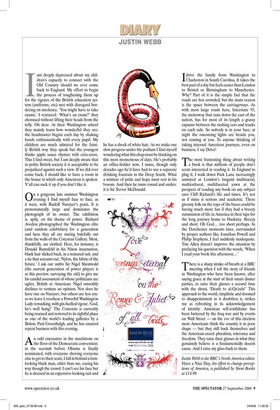I am deeply depressed about my children’s capacity to connect with
the Old Country should we ever come back to England. My effort to begin the process of toughening them up for the rigours of the British education system (uniforms, etc) met with disregard bordering on insolence. ‘You might have to take exams,’ I ventured. ‘What’s an exam?’ they chorused without lifting their heads from the telly. Oh dear. At their Washington school they mainly learn how wonderful they are; the headmaster begins each day by shaking hands enthusiastically with every pupil. My children are much admired for the faintly British way they speak but the youngest thinks apple sauce rhymes with criss-cross. This I find sweet, but I am deeply aware that in polite British society it is acceptable to be prejudiced against such a view. If we did ever come back, I should like to have a room in the house in which only American is spoken. Y’all can suck it up if you don’t like it.
On a gorgeous late summer Washington evening I find myself face to face, as it were, with Rudolf Nureyev’s penis. It is preternaturally large and dominates the photograph of its owner. The exhibition is, aptly, on the theme of power. Richard Avedon photographed the Washington elite (and random celebrities) for a generation and here they all are staring balefully out from the walls of the Corcoran Gallery. Most, thankfully, are clothed. Here, for instance, is Donald Rumsfeld in his Nixon incarnation, black hair slicked back, in a textured suit, and a tie that screams out, ‘Nylon, the fabric of the future.’ I ask our ambo Sir Nigel Sheinwald (the current generation of power players is at this preview, surveying the old) to give me his candid assessment of whose politicians are uglier, British or American. Nigel smoothly declines to venture an opinion. Nor does he have one on Nureyev, but others are less coy: as we leave I overhear a Powerful Washington Lady remarking, with gin-fuelled vigour, ‘God, he’s well hung!’ The Corcoran is currently being rescued and restored to its rightful place as one of the world’s leading galleries by a Briton, Paul Greenhalgh, and he has ensured repeat business with this evening.
An odd encounter in the maelstrom on the floor of the Democratic convention: in the seconds before Obama is finally nominated, with everyone shoving everyone else to get to their seats, I fall in behind a trimlooking black man, older than me, easing his way though the crowd. I can’t see his face but he is dressed in an expensive-looking suit and he has a shock of white hair. As we make our slow progress under the podium I find myself wondering what this chap must be thinking on this most momentous of days. He’s probably an office-holder now, I muse, though only decades ago he’d have had to use a separate drinking fountain in the Deep South. What a mixture of pride and hope must rest in his bosom. And then he turns round and smiles: it is Sir Trevor McDonald. Idrive the family from Washington to Charleston in South Carolina. It takes the best part of a day but feels easier than London to Bristol or Birmingham to Manchester. Why? Part of it is the simple fact that the roads are less crowded, but the main reason is the space between the carriageways. As with most large roads here, Interstate 95, the motorway that runs down the east of the nation, has for most of its length a grassy expanse between the rushing cars and trucks on each side. So nobody is in your face; at night the oncoming lights are beside you, not coming at you. To anyone thinking of taking internal American journeys, even on business, I say Drive!
The most frustrating thing about writing a book is that millions of people don’t seem interested in reading it. In England to plug it, I walk down Park Lane increasingly annoyed at London’s languid multiracial, multicultural, multifaceted yawn at the prospect of reading any book on any subject save Cliff Richard’s life and times. It’s not as if mine is serious and academic. These gloomy folk on the tops of the buses could be having much more fun if they had a breezy summation of life in America in their laps for the long journey home to Hackney. Breezy and short. Oh God... too short perhaps. In the Dorchester moments later, surrounded by proper authors like Jonathan Powell and Philip Stephens, I feel suddenly inadequate. Tim Allen doesn’t improve the situation by prefacing his question with the words, ‘When I read your book this afternoon...’ There is a sharp intake of breath at a BBC meeting when I tell the story of friends in Washington who have been known, after saying grace at the start of their smart dinner parties, to raise their glasses a second time with the shout, ‘Death to al-Qa’eda!’ This approach to the world, simplistic and doomed to disappointment as it doubtless is, strikes me as refreshing in its acknowledgement of identity. American self-confidence has been battered by the Iraq war and by events on Wall Street — on the eve of this election most Americans think the country is in poor shape — but they still back themselves and the American creed: pluralism, tolerance and freedom. They raise their glasses in what they genuinely believe is a fundamentally decent cause. And I raise my glass back to them.
Justin Webb is the BBC’s North America editor. Have a Nice Day, his effort to change perceptions of America, is published by Short Books at £14.99.










































































 Previous page
Previous page